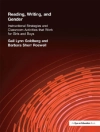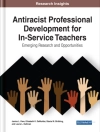The expert guide to grouping and acceleration practices for gifted and talented students!
The most influential works on acceleration and grouping practices for the gifted are gathered in this volume, which covers concerns about the effectiveness of such techniques, presents research on the optimal conditions and methods for the utilization of grouping and/or acceleration, and describes effective programmatic initiatives.
Key features include:
- A detailed accounting of the history of acceleration and grouping practices and their effectiveness by field leader Linda E. Brody
- Examples of successful grouping and acceleration practices specifically designed to meet the needs of gifted students in the regular classroom setting
- Numerous suggestions for putting the research findings to use
Designed with the busy educator in mind, a variety of grouping and acceleration models are studied in this ready-reference, followed by recommendations for implementation that will ensure appropriately challenging educational opportunities for gifted and talented students.
The ERGE Series:
The National Association for Gifted Children series Essential Readings in Gifted Education is a 12-volume collection of seminal articles from Gifted Child Quarterly. Put the knowledge and power of more than 25 years of research on giftedness and talent into your hands with the leading theories, studies, and findings the experts in the field have to offer.
Table des matières
About the Editors
Series Introduction – Sally M. Reis
Introduction to Grouping and Acceleration Practices in Gifted Education – Linda E. Brody
1. How Did Six Highly Accelerated Gifted Students Fare in Graduate School? – Julian C. Stanley
2. Five Years of Early Entrants: Predicting Successful Achievement in College – Linda E. Brody, Susan G. Assouline, and Julian C. Stanley
3. The Use of Radical Acceleration in Cases of Extreme Intellectual Precocity – Miraca U. M. Gross
4. The Use of Subject and Grade Skipping for the Prevention and Reversal of Underachievement – Sylvia B. Rimm, Katherine J. Lovance
5. The Impact of Early Entrance to College on Self-Esteem: A Preliminary Study – Ann E. Lupkowski, Marjorie Whitmore, and Annetta Ramsay
6. Accelerative Strategies: How Effective Are They for the Gifted? – Linda E. Brody, Camilla Persson Benbow
7. Educational Decision Making on Acceleration and Grouping – Joyce Van Tassel-Baska
8. Grouping Gifted Students: Issues and Concerns – John F. Feldhusen, Sidney M. Moon
9. Cooperative Learning and Ability Grouping: An Issue of Choice – Carol J. Mills, William G. Durden
10. Meta-analytic Findings on Grouping Programs – James A. Kulik, Chen-Lin C. Kulik
11. An Investigation of the Effects of Total School Flexible Cluster Grouping on Identification, Achievement, and Classroom Practices – Marcia Gentry, Steven V. Owen
12. Programming, Grouping, and Acceleration in Rural School Districts: A Survey of Attitudes and Practices – Eric D. Jones, W. Thomas Southern
Index
A propos de l’auteur
Sally M. Reis is a professor and the department head of the Educational Psychology Department at the University of Connecticut where she also serves as principal investigator of the National Research Center on the Gifted and Talented. She was a teacher for 15 years, 11 of which were spent working with gifted students on the elementary, junior high, and high school levels. She has authored more than 130 articles, 9 books, 40 book chapters, and numerous monographs and technical reports. Her research interests are related to special populations of gifted and tal-ented students, including: students with learning disabilities, gifted females and diverse groups of talented students. She is also interested in extensions of the Schoolwide Enrichment Model for both gifted and talented students and as a way to expand offerings and provide general enrichment to identify talents and potentials in students who have not been previously identified as gifted. She has traveled extensively conducting workshops and providing profes-sional development for school districts on gifted education, enrichment programs, and talent development programs. She is co-author of The Schoolwide Enrichment Model, The Secondary Triad Model, Dilemmas in Talent Development in the Middle Years, and a book published in 1998 about women’s talent development titled Work Left Undone: Choices and Compromises of Talented Females. Sally serves on several editorial boards, including the Gifted Child Quarterly, and is a past president of the National Association for Gifted Children.












